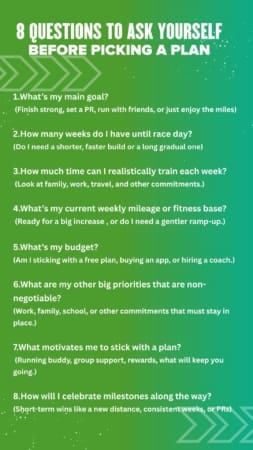How to Pick A Training Plan
Pick the training plan that’s right for you
Here are some important things to consider when picking your training plan.
1. Be honest with your goals
Every runner’s journey is unique. Are you aiming for a personal best, hoping to finish your first half, or just looking to enjoy themiles with friends? Be real with yourself about what you want out of this season. If you’re eyeing a speedy 10K before your February half marathon, your plan might need a little extra speed work early on. Your goals matter, let them guide your path!
2. Be realistic about your time commitment
If a plan has you running long runs on Saturday mornings, but that is when your son’s baseball games are, that might not be the plan for you. Starting your training further out leaves you more time to adjust for when “life happens.” Shorter plans are great for feeling the pressure and for those who find themselves losing interest after a period of time.
Training should fit into your life, not the other way around.
3. Build upon what you’re running right now
Your training plan should meet you at your current fitness level. Jumping into a plan with more miles than you’re ready for can lead to injury and frustration. Build on your current routine, and let your progress come naturally.
4. General or personal plan?
Decide if you want to invest in a personal plan or do you just want to follow a general plan. A general plan may be great to start and then switch to a more personalized plan once you feel you are ready to take it to the next level.
5. Check The Author
Choosing a big goal like running a half marathon or full marathon is something that you are investing so be sure to check what sources you are reading, because there are a lot of opinions out there. This is highly connected to making sure you are matching your current fitness level. Look for a certified coach with experience in your goal distance, such as The Run Plan. Don’t trust a random website with such an important goal (like running a marathon!).
Another great option is to find a local group or club in your city, and see if they have a group training plan or if there is a coach they recommend in your area. If you are in Austin, we have a full list at werunaustin.com
6. Include cross training
Some plans are strictly running while others incorporate other activities like yoga, cycling, or weightlifting. Cross training can be great for building strength, reducing injuries, and for preventing burnout.
7. Rest days are a necessity
Rest days aren’t optional, they’re essential. Your body needs time to recover and get stronger. If a plan doesn’t include recovery days, keep looking. Training for long distance running is a challenge and your body will be stronger if you give it the proper time to recover.
8. Be kind to yourself and allow change
Life is full of surprises. You might miss a run for a concert, a family visit, or just because you needed a little extra sleep. That’s okay! Reset, refocus, and get back out there. If your plan isn’t working for you, switch it up. The finish line will still be there, and so will we, cheering you on every step of the way








